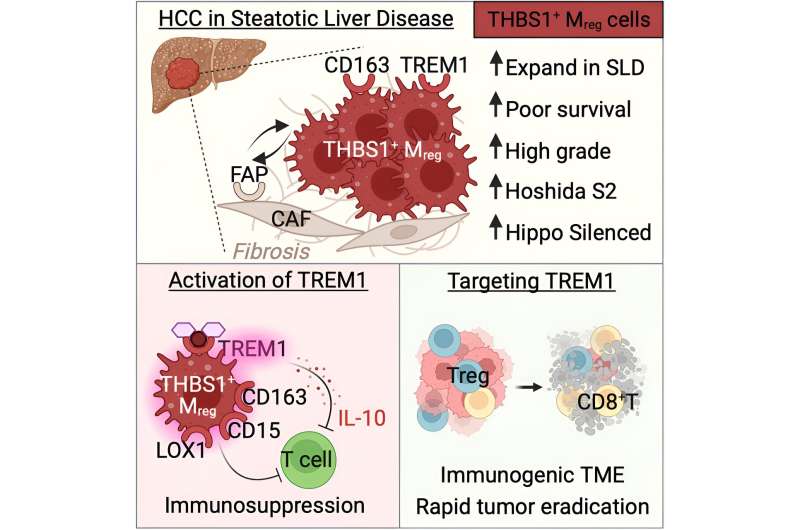This article has been reviewed according to Science X's editorial process and policies. Editors have highlighted the following attributes while ensuring the content's credibility:
fact-checked
peer-reviewed publication
trusted source
proofread
Liver cancer: A promising avenue for more effective immunotherapies

A research team of Canadian and French scientists, led by INRS professor Maya Saleh, has been investigating immunotherapy resistance in certain patients with hepatocellular carcinoma (HCC) associated with steatotic liver disease. The findings are published in the journal Cell Reports.
Hepatocellular carcinoma is associated with known risk factors such as chronic hepatitis B or C infection, alcohol abuse, and metabolic dysfunction. It is the most common type of liver cancer. Despite major advances in immunotherapy, this cancer is often fatal: around 75% of patients with advanced HCC fail to respond to this type of treatment for reasons that have yet to be clarified.
This encouraged the research team to explore the link between metabolic dysfunction-associated liver disease, a chronic inflammatory disease of the liver, and therapeutic resistance to immunotherapy in HCC patients.
"We have identified an immune biomarker for HCC associated with steatotic liver disease, which will allow us to develop new immunotherapies," explains Professor Maya Saleh, an international specialist in immuno-oncology. "We could envisage immunotherapies that restore an effective immune response against HCC by attenuating the damaging liver inflammation."
Discovery of a potential therapeutic target
HCC remains a major public health concern; in North America, its incidence has doubled in the past three decades. Prior to the approval of immunotherapy, the treatment options for advanced HCC were limited and ineffective. As an example, sorafenib improves mean overall survival by just 3 months and is associated with significant side effects.
Immunotherapies, when administered in combinations, increase the average survival of HCC patients by 17 months on average.
Thanks to the use of "omics" technologies, which allow large quantities of biological data to be analyzed in a short timeframe, the team developed an immune map of the tumor and adjacent non-tumoral liver in 10 patients. These initial immune maps led them to study databases of hundreds of patients in order to validate the immune profiles related to risk factors and associated with disease severity.
These initial results indicate that the chronic inflammation from steatotic liver disease makes the liver cancer environment unique, with an expansion of immunosuppressive cells that paralyze the immunological attack of the tumor.
The research team has demonstrated that the immunosuppressive cells express an inflammatory receptor named TREM1, which makes them more dangerous. They, therefore, highlighted TREM1 as a potential therapeutic target in HCC associated with steatotic liver disease.
Interesting implications for immunotherapy research
By identifying this biomarker, which could explain treatment failure in people with HCC, the team has paved the way for a new approach to classifying patients. This would allow them to determine who would be more likely to respond to immunotherapy before treatment even begins.
Such a scientific breakthrough would ease the psychological burden for patients who don't respond to immunotherapy. Important physical impacts, including side effects, could also be prevented.
"This is a promising avenue for the next few years. We will continue the analysis by characterizing the immune component of tumors in a larger cohort of patients, including comprehensive imaging of tumor cell composition and the use of artificial intelligence to link immune profiles to response to therapy. This could have a significant impact on the field," concludes Professor Saleh.
More information: Julie Giraud et al, THBS1+ myeloid cells expand in SLD hepatocellular carcinoma and contribute to immunosuppression and unfavorable prognosis through TREM1, Cell Reports (2024). DOI: 10.1016/j.celrep.2024.113773 , www.cell.com/cell-reports/full … 2211-1247(24)00101-3



















